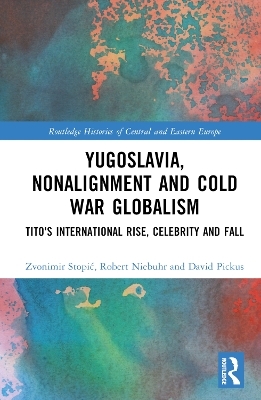
Yugoslavia, Nonalignment and Cold War Globalism
Routledge (Verlag)
978-1-032-37854-1 (ISBN)
Although Yugoslavia was correctly defined as a regional power, it is not true that Tito’s influence was confined to the Balkans alone. Even before the 1948 split with Stalin, political elites and intellectuals imagined socialist Yugoslavia as a model for international comity and development. Subsequently, due to dramatic changes in the climate of international diplomacy, Yugoslav globalist outreach found an audience and altered the course of early and fateful superpower stand-offs. In turn, such globalism was a significant part of Tito’s stewardship of nonalignment. This is a story that has never been fully told. Yugoslavia, Nonalignment and Cold War Globalism fills this gap in discussions of the emergence of globalist discourse in the post-1989 era.
This volume is aimed at scholars and students of the Cold War and Tito’s era in Yugoslavia, as well as general readers of history interested in leadership and the role of regional powers in world politics.
Zvonimir Stopić is an assistant professor at Capital Normal University, a researcher at CNU’s Institute of Global and Area Studies, and an associate at the Zagreb School of Economics and Management. His publications, which cover topics in Cold War and contemporary international relations, include Revolutionaries, Revisionists, Dogmatists, Dogs and Madmen: China and Yugoslavia from 1948 until 1971 (2022), and China, Yugoslavia, and the Socialist Worldmaking: Convergences and Divergences (2023). Robert Niebuhr is a teaching professor and Honors Faculty Fellow at Arizona State University. He has published widely on topics ranging from modern Yugoslavia to the Chaco War, including The Search for a Cold War Legitimacy: Foreign Policy and Tito’s Yugoslavia (2018) and ¡Vamos a avanzar!: The Chaco War and Bolivia’s Political Transformation, 1899–1952 (2021). David Pickus is an associate professor of History at The American University in Vietnam. He was a Fulbright scholar in Belgrade, 2007–2008. His other publications cover Germany and East-Central Europe, China and globalization, refugee intellectuals and literature and pandemic.
Introduction: Cold War Outside Superpowers 1. From the Adriatic to the 38th Parallel 2. Rise of Globalism: Yugoslavia in the Early 1950s 3. Transition to Cold War Stability: Between Rangoon and Bandung 4. The Formula for Globalism 5. Solidification of a Global Politic 6. Filling the Gap: Yugoslavia’s Global Role Reimagined 7. High Titoism: Yugoslavia Leads the Way 8. Titoist Globalism’s Last Act Conclusion
| Erscheinungsdatum | 18.09.2024 |
|---|---|
| Reihe/Serie | Routledge Histories of Central and Eastern Europe |
| Verlagsort | London |
| Sprache | englisch |
| Maße | 156 x 234 mm |
| Gewicht | 594 g |
| Themenwelt | Geschichte ► Allgemeine Geschichte ► Zeitgeschichte |
| Geisteswissenschaften ► Philosophie | |
| Sozialwissenschaften ► Politik / Verwaltung ► Politische Systeme | |
| Sozialwissenschaften ► Politik / Verwaltung ► Politische Theorie | |
| Sozialwissenschaften ► Soziologie ► Spezielle Soziologien | |
| ISBN-10 | 1-032-37854-9 / 1032378549 |
| ISBN-13 | 978-1-032-37854-1 / 9781032378541 |
| Zustand | Neuware |
| Informationen gemäß Produktsicherheitsverordnung (GPSR) | |
| Haben Sie eine Frage zum Produkt? |
aus dem Bereich


